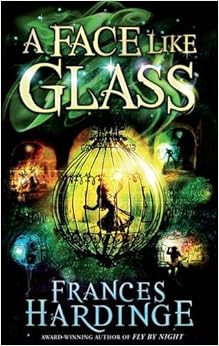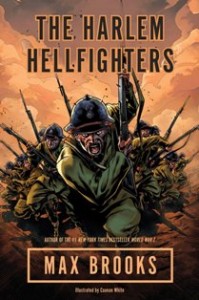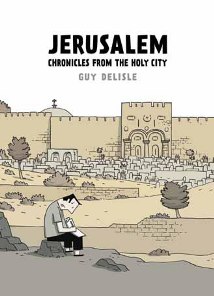Here it is the middle of November, and I have to accept that I am never going to get full posts written on some of these books before the end of the year. So I am doing a small batch edition. First up, Max Brooks and Canaan White’s comic The Harlem Hellfighters, which I received from the publisher for review consideration, and am (eek!) reviewing rather belatedly. The Harlem Hellfighters were an all-black infantry regiment in World War I; they never lost a man through capture or gave up a foot of ground to the enemy. Rather touchingly, Max Brooks learned about this unit when he was eleven and has always wanted more people to know about their heroism in the First World War.
Canaan White’s black-and-white line drawings are lovely, and you can’t help but be moved by the story. Throughout their training, the Hellfighters are subject to vicious prejudice from their fellow American soldiers on account of their skin color. They’re considered second-class citizens in the very country they’re fighting to defend, and every battle they fight is proof of their worth as men and as soldiers. I teared up a few times when Brooks quotes praise they received for their extraordinary bravery. However, Brooks doesn’t bring a lot of new stuff to this story. The characters aren’t very well-delineated; where the book succeeds, it’s because the history itself is an incredible story.
As travel writers go, I am fond of Guy Delisle, who writes cartoon memoirs of his time in various far-away nations. (His wife works for MSF, so the family travels.) Jerusalem, like all of Delisle’s books, focuses on the lived experiences of living in conflict-torn areas: the laws, yes, but most often the way people live within those laws, the workarounds they find, the small annoyances, the insane contradictions that arise from lawmakers failing to think their policies all the way through.
Honestly I will probably never travel to Israel (I have other places to go that do not cause me that same level of ideological and emotional stress), so I like to hear from Delisle what it’s like to be there. Do I depend on him for sophisticated political analysis? Nope, but the man writes a reliably enjoyable travelogue.
Officially, I’m off Crazy Family Memoirs, but I checked the end of Brando Skyhorse’s Take This Man and was pleased to discover that his mother and grandmother are already dead. So the only person’s feelings to get hurt by this book would be Skyhorse’s biological father, with whom he reconnected a few years before the book was published. And that guy barely features. And he maybe should have his feelings a little bit hurt, because it’s not cool to ditch your kid even if the kid’s crazy mother is forcing your hand.
Take This Man is about Skyhorse’s string of fathers. The biological son of a Mexican, Skyhorse’s mother claimed that both she and he were Indians, and that he was the son of an Indian, Paul Skyhorse Johnson, in prison for resisting the government in some unspecified way. Over the course of his childhood, this was one of the least crazy lies she told him. Her perpetual hunt for a man to take care of her presented little Brando with stepfather after stepfather–each of whom his mother demanded he refer to as his father. Once one of the stepfathers took off, Brando’s mother insisted that that person had never been his father in the first place.
I think I’ve said before in this space that it feels weird to review family memoirs. I give your f*cked-up childhood three stars! Not enough knife fights to merit four! So I’ll just leave it by saying that I’d have enjoyed this book more if it had more jokes. Not because screwed-up childhoods have to be funny, but just because without jokes I get real sad about them.
Last but not least, I finally read my first! Ever! Frances Hardinge book! Long long long ago, the wonderful Ana sent me A Face Like Glass, and because it was slightly slow to start, I panicked and hid it under the couch to prevent myself from discovering that I didn’t like Frances Hardinge after all. Silly Jenny, I should never have worried that Ana would steer me wrong. Though the first third of A Face Like Glass contained more studied whimsy than I prefer, the second two-thirds more than made up for it. The premise is too insane for me to go into much detail about, so you will just have to believe me when I say that it’s worth sticking with. There is a final act that brings together everything that has happened up to that point in a wonderfully crazy and brilliant and intricate climax. With a message about social justice! (that is not too messagey)

Thanks, Ana! I am sorry it took me so long to read this! It . . . was under my couch for much of the year. Next up, Cuckoo Song!

